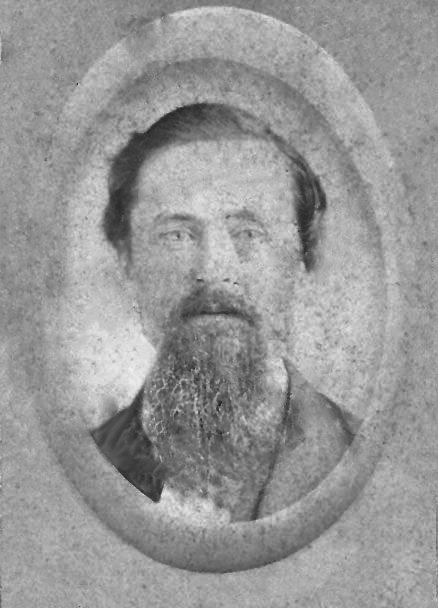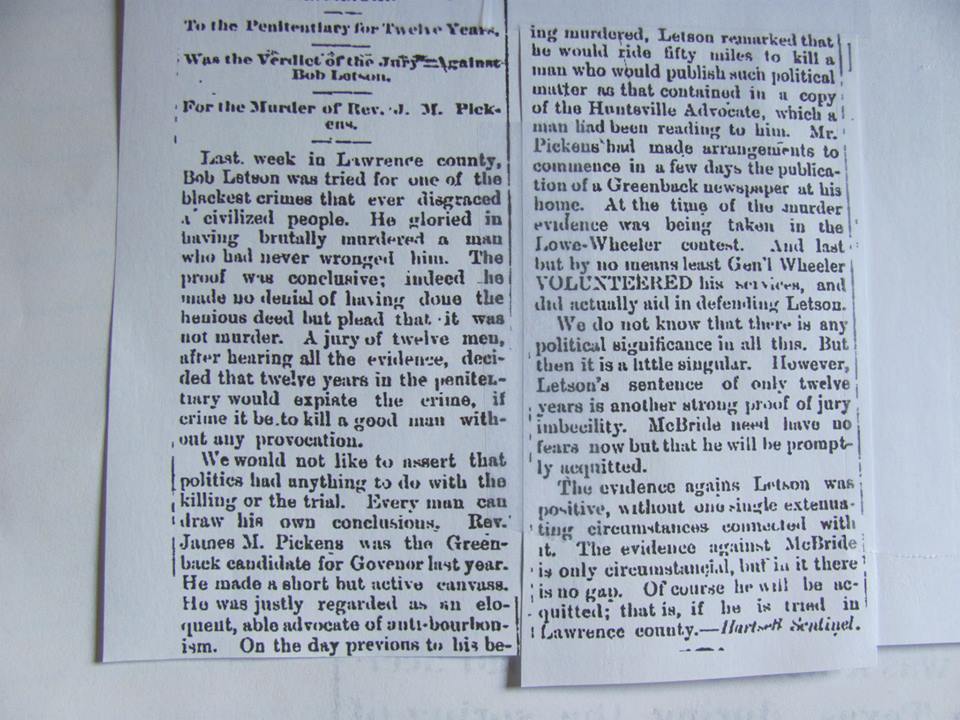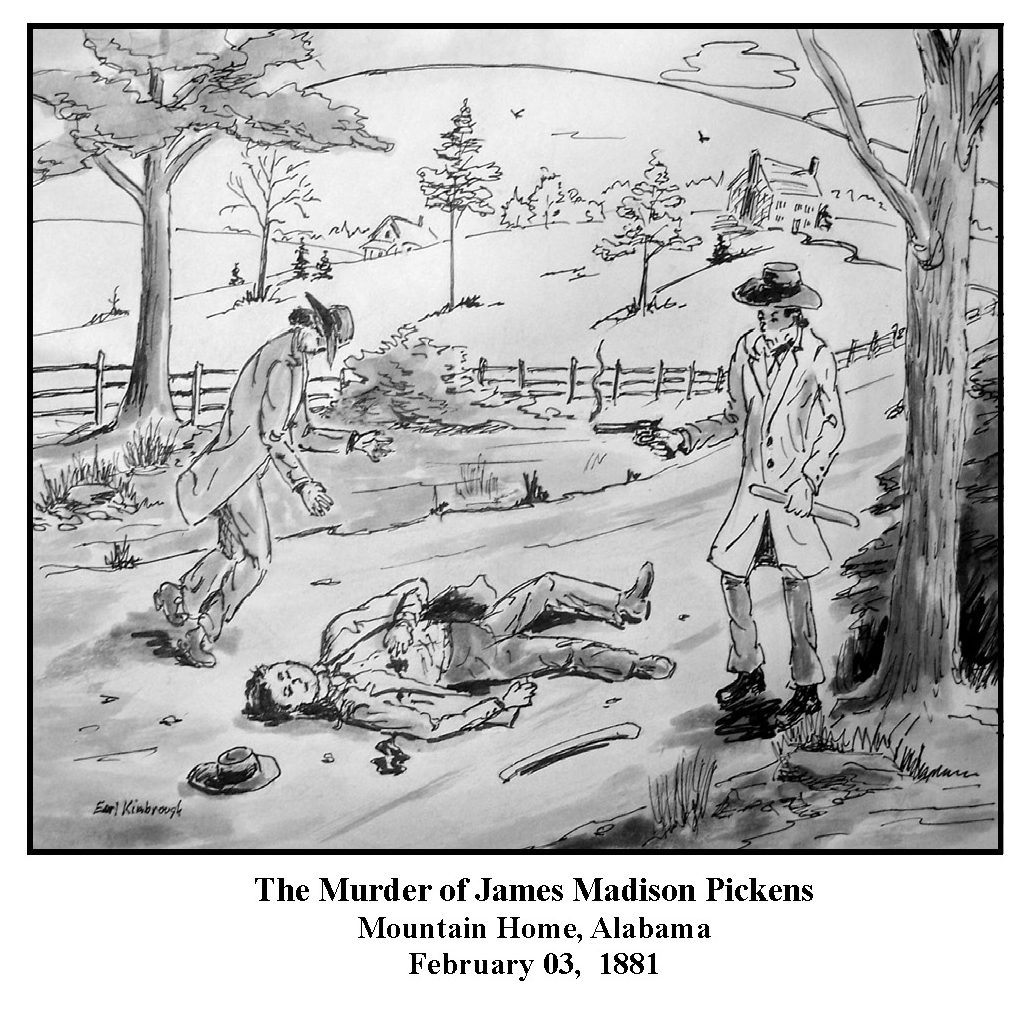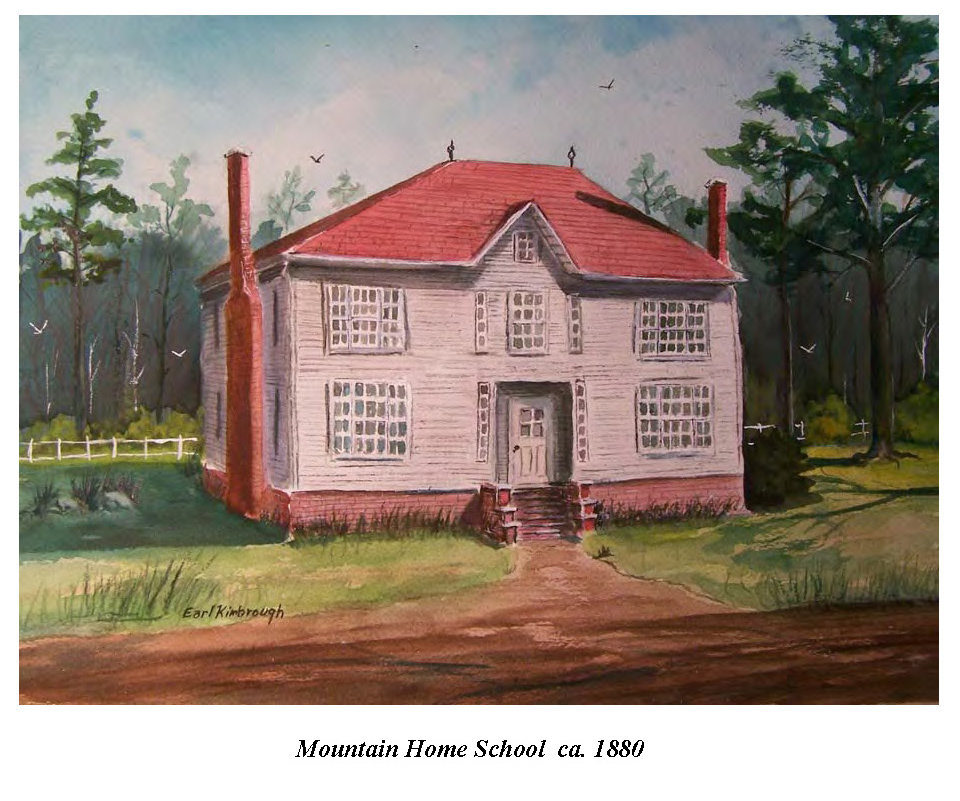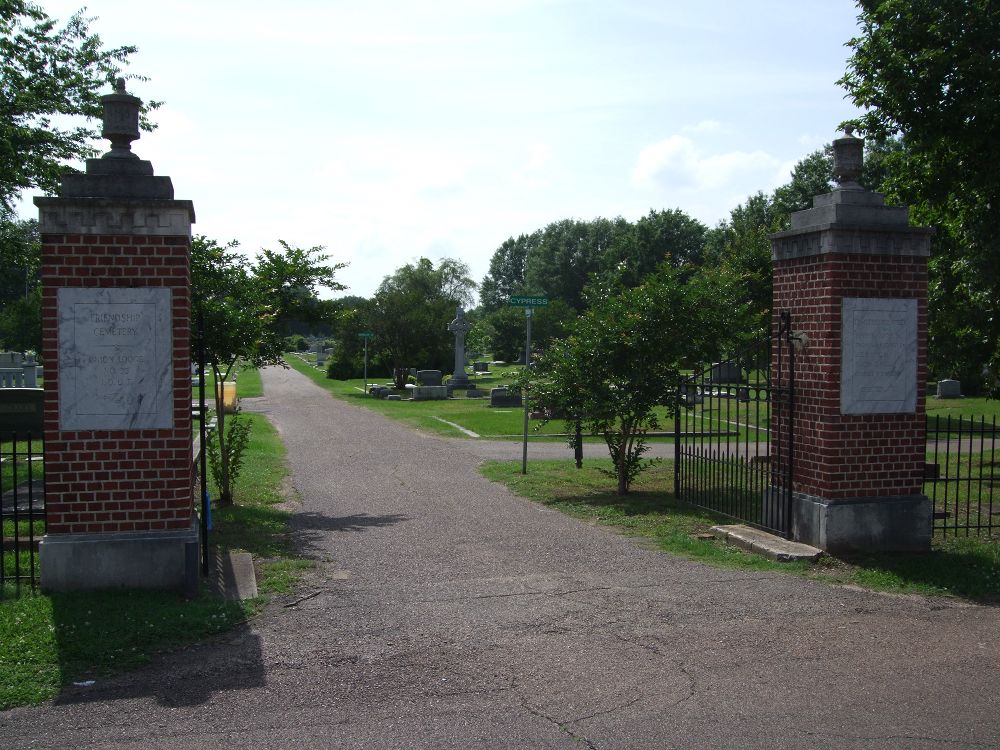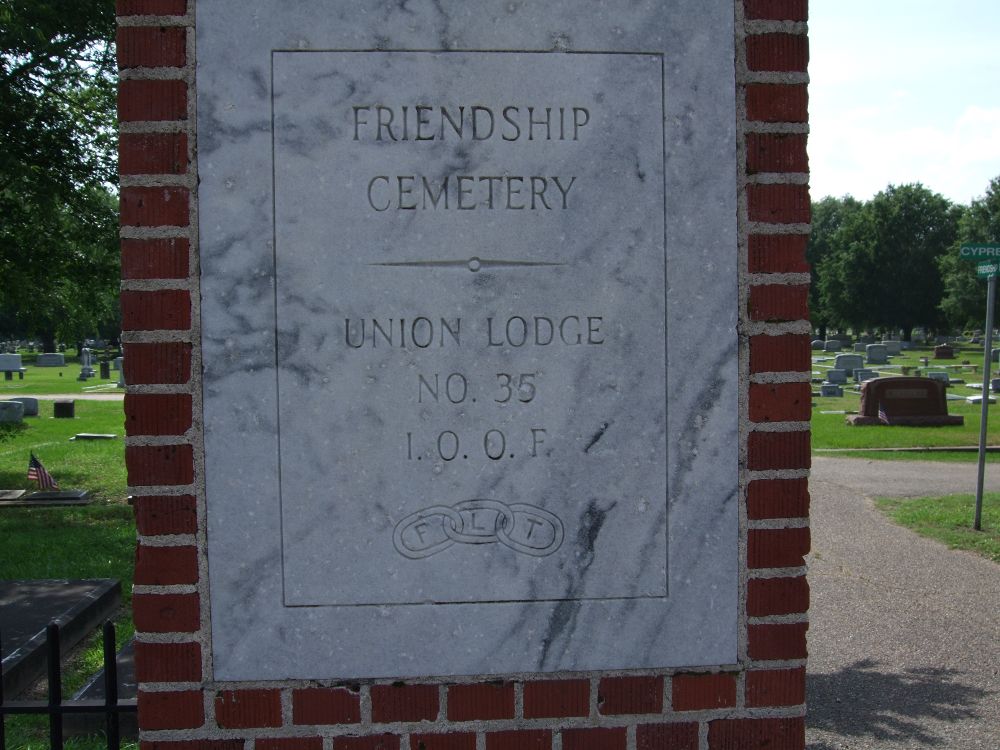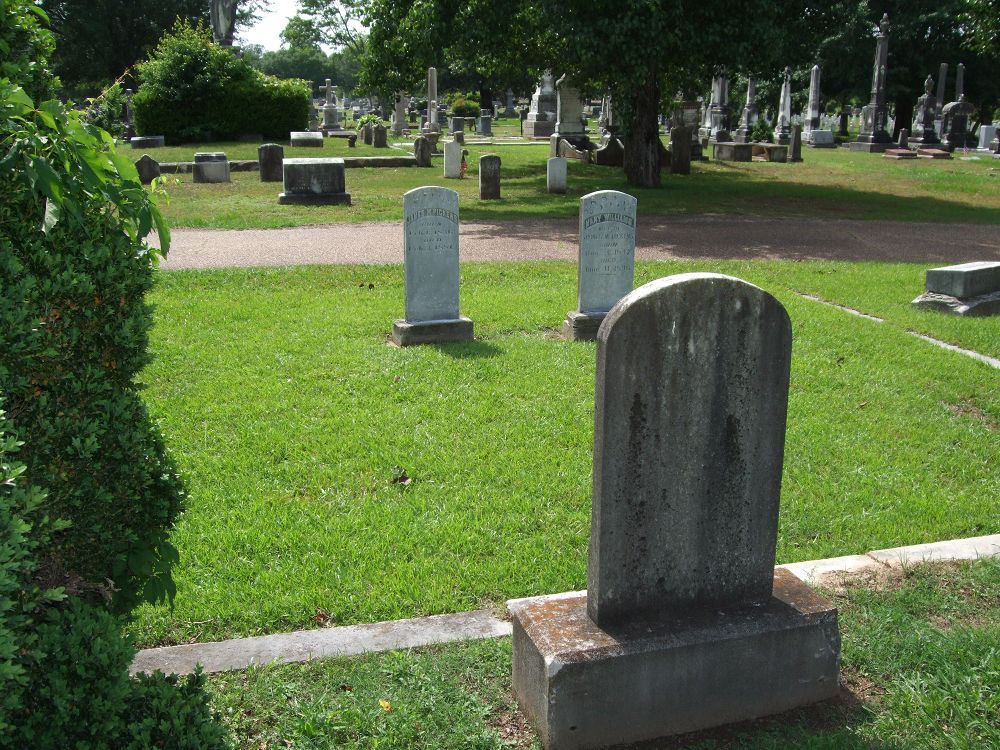James Madison Pickens
(1836-1881)
![]()
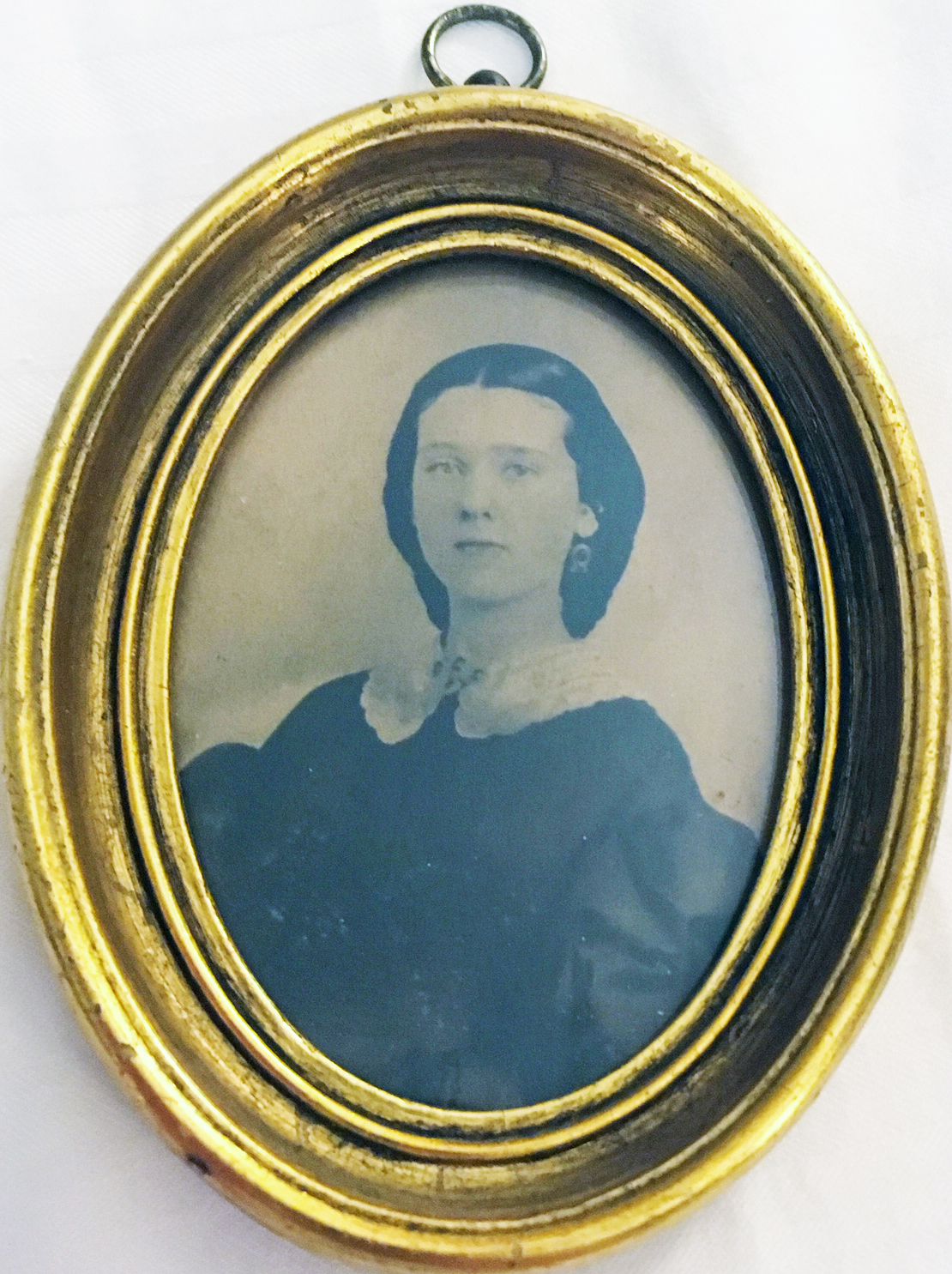
Mary Catherine Williams
Born May 3, 1847
Picture taken at age of 15
Married James M. Pickens
September 25, 1866
Died June 11, 1896
-photo courtesy of Scott Smith, Spring Hill, TN, 04.2018
![]()
Biographical Sketch on the Life of J.M. Pickens
In the latter part of 1867, at the call of Bro. J. M. Pickens, of North Alabama, a meeting was held at Columbus, Miss., for the purpose of consulting with reference to the condition and needs of the church in Alabama and Mississippi, and of inaugurating a cooperative meeting, I know not what churches, nor how many, were represented. From the report made at the time, I learned that the brethren in attendance had a very pleasant and harmonious meeting, discussing the state of affairs, and listening to the good sermons that were delivered by the preachers who were present, The only practical result of the meeting so far as I know, was that Bro. Pickens was selected to evangelize in Alabama and Bro. Manire in Mississippi. The selection of myself was at the suggestion and urgent solicitation of Dr. S. R. Jones, as I learned from him on his return from the meeting. It was resolved that our salary for the year's labor should be fifteen hundred dollars each, that is, provided that we raise it ourselves. This proviso, it is true, was not expressed in the resolution; but it ought to have been, for so far as our financial support was concerned, it was the very gist of the whole matter. An executive committee was appointed to solicit contributions for the work; but, if that committee ever received a dollar, or even a penny, I never heard of it. That treasury was filled with emptiness from beginning to end. Bro. Pickens entered on the work in his State, but for want of an adequate support was soon compelled to enter the schoolroom as a teacher, and that ended the Alabama part of that cooperation.
J. M. Pickens was then comparatively a young man, although he had been preaching for several years. He was a man of superior ability both natural and acquired. He afterwards labored extensively both in North Alabama and North Mississippi, and had more than ordinary success, considering the times and the circumstances. In 1870, as I remember, he began the publication of the "Southern Christian Monthly" in Columbus, Mississippi. This was afterward changed to the "Southern Christian Weekly," which was published for a short time at Eutaw, Alabama, then at his residence, Mountain Home, Alabama, and finally at Jackson, Tennessee, where he sold it to William E. Hall, who moved it to New Orleans, and changed it into the "Iron Preacher."
Only a man of Bro. Pickens' indomitable perseverance, untiring, energy, and inflexible will, could have sustained such a work so long under conditions so unfavorable. He was fond of discussion, and had a number of debates, the most noted of which was with the renowned Jacob Ditzler. With all these, the brethren who heard them were not only satisfied but also delighted, and with none more so than with his debate with Ditzler. The doughty Dr. not expecting to find such a man in the mountains of North Alabama, had anticipated an easy victory, but was doubtless as badly disappointed as in any debate he ever held, for Pickens picked him all to pieces. The last year of Bro. Pickens' regular work as a preacher was spent in Columbus, Mississippi. Returning to his home in Alabama in 1880, he became a candidate for Governor of the State on the Greenback ticket, but was defeated. Resuming his studies and labors as a preacher, he was wantonly murdered in the spring of 1881, in broad daylight, and within sight of his own house. He was in the very prime of a vigorous manhood, and had hardly reached the zenith of his power and usefulness, when he was so strangely and so sadly cut off.
--From "Reminiscences Of Preachers And Churches In Mississippi," by B.F. Manire, Chapter 5
![]()
James M. Pickens:
Preaching In A War-Weary Land
Wesley Thompson said: "There is in this world no struggle that is so intense and severe as that of civil strife; a man has no enemies so vicious and avowed as those of his own country and among his own acquaintance and kin, in civil strife." (Adapted.) The years following the War Between the States were especially harsh for the people of Northwest Alabama. Many of the area's most productive men were killed or dreadfully wounded in battle. Widows and orphans of war filled the land. The people were demoralized and many in distress. Poverty abounded. Ante-Bellum Alabama died with the war and a new state emerged, born from the ashes of defeat and loss, along with the agony of Reconstruction. The painful rebirth of the South forms the dark and dreary background for the Christians of this region.
C. Wayne Kilpatrick referred to 1866-1880, the years following the war, as "the period of recovery and expansion." He spoke particularly of Lauderdale County where: "T.B. Larimore, J.H. Dunn, John Taylor, and J.M. Pickens, along with others, salvaged the war torn churches in this county and nursed them back to a healthy growing stage. The twentieth century Churches of Christ may have been virtually nonexistent without the aid of these great men immediately following the war."1 The weakened and scattered churches needed reviving, and the broken lives of many members needed mending. Both churches and members were plagued by the anguish, grief, and animosity caused by the war. There was also a great residue of ill will, even among the brethren, due to the bitter divisions over the war.
Those who saw the devastation of Northwest Alabama, created by four years of seesawing armies and renegade bands, agreed that it was not possible to adequately describe it to any who did not see it themselves; but they tried. Thomas D. Butler, a Northern Christian who traveled through the area by rail one year after the war, wrote: "From Decatur we traveled 100 miles through the Northern part of Alabama. There might be more desirable and inviting lands through the South, but I have rarely seen a richer and more beautiful tract of country than that extending from the Tennessee [River] to Corinth, Miss. The population of the region seems like 'a few souls' saved from a tornado, which, far and wide ... was swept with the scourge of death.... The ruins of happy homesteads are piled in solitary heaps, and the trail of war is broad, deep, and black. The hammer, axe, and saw are dexterously applied to the work of reconstruction within the former lines ... and the lands are being rapidly enclosed with millions and millions of rails."2
Some Christians in Tennessee and states farther north saw the appalling condition of the churches in Alabama and sought to help. Robert B. Trimble of Spring Hill, Tennessee, was largely responsible for two exceptionally able young preachers casting their lot in Northwest Alabama to help revive the churches. These were James M. Pickens and T.B. Larimore. Pickens first came in 1866 and settled at Mountain Home in Lawrence County, the middle of his planned field of labor, where he started a school in 1868. Larimore came from Tennessee early that year to teach in Pickens' school. Trimble was an associate of E.G. Sewell and David Lipscomb. Each of these had a hand in Larimore's coming to Alabama to work with Pickens after finishing Franklin College. It is likely that Tolbert Fanning, whose early home and first preaching was in North Alabama, also encouraged Larimore's coming.
Three men that came into that country after the war did noble service in reviving and strengthening the cause of Christ that had been left in shambles by the war. They were J.M. Pickens, T.B. Larimore, and Joseph H. Halbrook. James Madison Pickens, a native of Obion County, Tennessee, was a young man in his mid-thirties and already an evangelist of exceptional ability. His express purpose in coming to Northwest Alabama was to help rebuild New Testament Christianity in that region. He remained there, except for a brief time in Mississippi, until his tragic death in 1881.
Several good men labored zealously and sacrificially to re-establish the decimated churches in North Alabama during those trying years, but Pickens, although barely remembered today, was the first missionary on the scene and without doubt the most important single force during that period in gathering together the remnants of the churches of Christ, in restoring them to divine service, and in strengthening and guiding them through the nine turbulent years of Federal Reconstruction. Few men were better suited by temperament and talent to fill his place or to match his accomplishments.
In a letter to Fanning and Lipscomb, editors of the Gospel Advocate, Pickens wrote: "According to your request published in the Advocate, I give you a report of my labors South of the Tennessee. Seeing that the laborers were few in this section, and that the cause of our Master was sadly neglected, and likely to still be, I left the pleasant associations of our brethren in Tennessee in the month of February. The first place I visited was Tuscumbia, Ala., where I preached for eight days, during which we succeeded in organizing a small congregation from scattered remains of a once large one, that assembled in that place, to which we also had some additions. This congregation contains some good material, and displays commendable zeal, and is under the care of a competent elder [Dr. Lewis C. Chisholm], we being judge; but a meetinghouse is yet to be built."3
Pickens further said: "Subsequently, in company with Bro. Trimble, I visited Russellville, but it is a sad tale of havoc which time and neglect have made of that once large and flourishing church—the members scattered, the house torn to pieces and almost destroyed, and the candlestick removed out of its place, were some of the features it presented. But still there were a few of the faithful left. We labored there a week, and after we set in order the things that were wanting the best we could, and added several unto them, we left them under a promise that they would keep up the regular meetings, which I learn they have continued to do ever since. The brethren will please remember that the house is yet to be repaired."4
From Russellville, Pickens returned to Tuscumbia before going on to Corinth, Mississippi, where he found that both the church and its meetinghouse had been devastated by the war and Satan. As to his work at Tuscumbia, Dr. Chisholm, writing in the summer of 1866, said: "During the last winter our young brother, J.M. Pickens, rather accidentally visited Tuscumbia, where he very soon assembled a little flock that seemed both willing and anxious to keep the ordinances of the Lord, but at that time it seemed next to impossible to get a hearing, but the scale has now turned.... We are steadily gaining ground and adding to our number, but the labors of Bro. Pickens have not been confined to Tuscumbia alone. We had the pleasure of visiting Moulton, Ala., in company with him last week, and a more interesting meeting we never witnessed. The interest seemed to increase to the very close. The people seemed to be spellbound and taken captive by the majesty and force of the truth. The church that formerly met at that place was most effectually aroused from its lethargy, the erring reclaimed and sinners came flocking to the fold.... Bro. P[ickens], labored faithfully with us, and promises to continue his labors in North Alabama, Mississippi and West Tennessee."5
J.H. McDonald of Moulton also wrote about the condition of the church at that place soon after the war. "We have been taught, year upon year, by those who understood the truth, yet such have been the troubles of the four or five years past, that our courage was not equal to our obligation, but we are aroused, and have renewed our vows.... One of you [Tolbert Fanning] who has labored for us will rejoice with us that there was within us such a will as would induce recovery from our waywardness. Our beloved brother, J.M. Pickens, from your state, spent some four or five days with us ... in July, and his labors were successful in putting us to work in duties which belong to the house of the Lord, and in adding by baptism ten."6
Later in 1866, Pickens held a five-day meeting at Frankfort, the county seat of Franklin County, and reorganized the church there. In reporting this, he wrote: "When I commenced there was a Methodist meeting going on, but they agreed to give way to me to preach one discourse, after which they discontinued their meeting, and I had the field alone. [At the close of the meeting] I organized a congregation of forty-two strong."7 The meeting was held in the courthouse and resulted in fourteen "accessions"—twelve by immersion and "two from the Baptists." The parents of F.D. and F.B. Srygley were baptized at Frankfort that year, evidently in that meeting. John Taylor, no doubt, participated in this meeting as his home was near Frankfort. The Rock Creek church that Taylor started soon after this included some that were baptized by Pickens in that Frankfort meeting.
In 1874, Pickens preached in meetings at Union on Buttahatchee River in Marion County, and at Berea, in Fayette County. In reporting these meetings, he said: "We made many pleasant acquaintances. Among others, that of John McCaleb, a veteran and a pioneer in Alabama, whom we met here for the first time. Old Bro. Taylor was with us in both of the meetings and gave much valuable assistance."8
Pickens debated Dr. Jacob Ditzler, the great defender of Methodism, in 1873 at McKendree's Chapel, a Methodist Church in Morgan County. David Lipscomb debated Ditzler two years earlier in Gallatin, Tennessee. Dr. T.W. Brents, L.B. Wilkes, and G.S. Sweaney also met the "doughty" Methodist in debate. B.F. Manire said Ditzler, not expecting to find such a man as Pickens in the backwoods of Northwest Alabama "had expected an easy victory, but was doubtless as badly disappointed as in any debates he ever had, for Pickens picked him all to pieces."9
Pickens employed every avenue open to him—pulpit, classroom, and press—to carry the message of salvation to lost souls and to encourage his brethren to faithfulness in serving the Lord. For several years, he published gospel papers, first The Christian Monthly, and then The Southern Christian Weekly. These were circulated in North Alabama and parts of Mississippi and Tennessee. His debate with Ditzler was published in the Southern Christian Weekly in 1874. In his work, he was associated with John Taylor and preached near Taylor's home in Franklin County. In 1867, Taylor traveled with Pickens and John A. Thompson to a consultation meeting in Columbus, Mississippi. Taylor was also with Pickens in a meeting in Morgan County, and other places, indicating a close relationship.
Even though Pickens was a comparatively young man, B.F. Manire described him as "a man of superior ability both natural and acquired." Selina Campbell, the widow of Alexander Campbell, spent time with a niece at Wheeler station, Alabama, in the late 1860s. This was not far from Pickens' home and he became acquainted with Mrs. Campbell. During a visit with her, she presented him with an inscribed copy of Living Oracles, a translation of the New Testament compiled and published by her husband more then 40 years before. The volume, which was Campbell's personal copy, is preserved in the Disciples of Christ Historical Society in Nashville. [Note: Collection now in Bethany, W.V.] In a letter to the Christian Standard, Mrs. Campbell spoke of Pickens' work in Alabama. The Standard said: "Mrs. Campbell writing from Ingleside Plantation, near Courtland, Ala., tells of the needs of northern Alabama and how James M. Pickens, working at his own expense, has organized 8 churches and baptized over 200. She summons the brethren to support him and tells of her sympathy for the Freedmen."10
Pickens frequently preached at Moulton and preached monthly at Mooresville where Gen. James A. Garfield had preached during his six months mission in the Tennessee Valley along the Memphis and Charleston Railroad during the War Between the States. Perhaps typical of Picken's ministry was a two weeks tour through Marion and Fayette Counties in 1874. He wrote: "We were with the church at Buttahatchee six days; and delivered ten discourses. On Sunday the attendance was exceedingly large, so much so, that we had to abandon the house for the grove. During the week we occupied the house though the attendance was too large for its capacity."11
Thirty-two were added to the church on the Buttahatchee, which was one of the largest in the state, numbering about 300 members. From there Pickens preached to a large congregation at the Hopewell Baptist Church sixteen miles away. The next morning found him at Berea with the church established by John Taylor. He preached eleven times and saw 22 souls added to the church. During the same year, Pickens attended a consultation meeting at Trenton, Tennessee, and addressed the brethren on the subject of, "Whiskey Making, Whiskey Selling, and Whiskey Drinking by Members of the Church of Christ." We assume that he opposed all three activities.
Consultation meetings, usually unorganized gatherings of brethren, were beginning to develop into missionary societies, which were strongly opposed by J.M. Pickens. He spoke in Columbus, Mississippi, in 1870 in opposition to the Louisville Plan, an effort to revitalize the American Christian Missionary Society that had been receiving tepid support. His main opponent at the meeting was T.W. Caskey. He answered each point Caskey made in its favor. He also made an eloquent appeal for congregational independence and against centralized cooperation. He published his response to Caskey in the Christian Monthly, in August 1870.
In 1880, Pickens became a candidate for governor of Alabama on the Greenback-Labor Party ticket, known in the state as the People's Anti-Bourbon Party. He carried only three counties: Lawrence, Colbert, and Winston, but received about one-third of the votes cast in the state. This was the year Garfield was elected president. The Alabama election was so corrupt that the New York Times sarcastically described the ballot box the Democrat's used in the Black Belt as a "two story ballot-box." A mechanism in the top box quickly discarded all black votes and replaced them with "pure white" ballots. Pickens would not likely have won with an honest election, but he believed the party would have faired better.
Pickens' life ended February 2, 1881 when he was wantonly murdered "in broad daylight and within sight of his house." The papers reported that Robert Letson mortally wounded William Davidson as he and Pickens were walking in a lane to the woods where some chopping was being done. Letson had accused Davidson of slandering his daughter. Pickens knocked the pistol out of Letson's hand with an ax helve. There was a scuffle and Letson regained the pistol and shot Pickens twice, killing him instantly. This is based on a letter from Pickens' son, J.M. Pickens, Jr., to Richard L. James that is in the Pickens' collection at the Disciples of Christ Historical Society in Nashville. [Note: Now at Bethany, W.V.] Some believe Pickens' was assassinated by political enemies because he planned to publish a newspaper to expose the Democrat's corruption.
Paul Horton, writing on "The Assassination of Rev. James Madison Pickens and the Persistence of Anti-Bourbon Activism in North Alabama," said: "In the wake of Pickens's death Bourbons tended to insist that Letson's rage was motivated by Davidson's slander of his daughter and that the case was clearly second-degree murder. Anti-Bourbons, on the other hand, saw the crime as a political assassination fitting a pattern that extended back to Klan outrages during Reconstruction. Bourbons, from this perspective, would not tolerate free speech and harassed or killed those who challenged them publicly."12 However, we believe the son's report of the matter.
It may be of interest to add that Horton further said: "A.H. Brittin of the Huntsville Advocate described Pickens as a man of 'iron will, great energy and honest industry.' He was 'universally esteemed and greatly loved' and 'deeply' sympathetic to the plight of 'the oppressed and down-trodden sons of toil.' Moreover, according to Brittin, he was 'thoroughly imbued with a determination to right the gigantic wrongs under which 'Ring Bourbonism' had crushed the hopes of his fellow citizens.' Pickens knew [Bourbon politician] Joe Wheeler, who summered near the town of Mountain Home to escape the valley heat. Pickens's class perspective and his emotional religiosity clashed with Wheeler's social climbing, reserved demeanor, and Episcopal prep-school upbringing. The two leaders did not like one another."13 Horton, a student of Alabama politics in this period said: "Pickens's philosophy was at the core religious."
Pickens was only 45 and probably ready to do his greatest work. Historians of note regard his untimely death as a hindrance to the churches of Christ in North Alabama and the Mid-South. He established a number of churches, made numerous converts, and was a great power for good in encouraging, strengthening, and restoring churches in many places. He was principally responsible for reviving the churches at Russellville, Moulton, Frankfort, and Tuscumbia. He is also credited with organizing Christians in Florence, Mooresville, Danville, and Huntsville. He worked tirelessly in weekly preaching, and holding meetings and debates. Horton said: "He preferred to work with the less educated and the poor and was an outspoken critic of status-seeking city ministers who lost their true calling in an effort to keep up with the 'appearances' put on by their well-to-do congregations. Pickens's 'primitive' Christian mission was devoted to the poor who could find dignity and self-respect in a simple, rock-solid faith."14
-Earl Kimbrough, Pioneer Preachers of North Alabama #4
Notes
1 Journal of Muscle Shoals History, Vol. 11.
2 Christian Standard, May 5, 1866.
3 Gospel Advocate, May 8, 1866.
4 Ibid.
5 Gospel Advocate, Sept. 11, 1866.
6 Ibid, Oct. 2, 1866.
7 Ibid, Sept. 18, 1866.
8 Southern Christian Weekly, Aug. 20, 1874.
9 B.F. Manire, Reminiscences of Preachers and Churches in Mississippi.
10 Christian Standard, April 27, 1870.
11 Southern Christian Weekly, Aug. 20, 1974.
12 Alabama Review, April 2004.
13 Ibid.
14 Ibid.
![]()
BIOGRAPHICAL SKETCH OF JAMES M. PICKENS, (SENIOR)
James Madison Pickens was born in Maury County, Tennessee, February 6, 1836, being the third of seven children of William G. and Charlotte Bruce Pickens. His father came from Abbeville district of South Carolina. Most of his childhood and youth were spent on the farm.
He was an apt scholar and fond of books and is said to have spend much of his leisure in reading and study and to have learned much of Latin and Greek in this way. After a preparatory course, he attended Jackson College at Columbia, Tennessee, and afterwards went to the University of Kentucky at Lexington, but did no graduate. It is probable that his college work was interrupted by the Civil War, but he continued to improve his education by private study in after years. Beside Latin and Greek, he had some knowledge of Hebrew. In later life he was regarded as quite a scholar for his time and section. He was brought up in the Christian Church (Disciples of Christ), of which his parents were members, and his studies were largely directed toward the ministry. In the Civil War he served in the Confederate Army. The records show that he enlisted August 28, 1861, at Camp Galloway, Columbia, Tennessee, for eight months, as a private in Captain Edmund O'Neill's company, 2d Regiment Tennessee Volunteers, subsequently Company B, 2d (Robinson's Regiment Tennessee Infantry). On February 14, 1862, he re-enlisted for two years. He was discharged at Corinth, Mississippi, April 4, 1862. The reason for his discharge is not known, but as the date is just two days before the battle of Shiloh near Corinth, it is surmised (by an official of the war record office) that his discharge was a part of the process of eliminating those of ill health or otherwise unfit, as is very unlikely that an able-bodied soldier would have been released at such a time.
A historical work (J. B. Lindsley, The Military Annals of Tennessee, 1886) states that the Second Tennessee Regiment, during the period of the service of Mr. Pickens, "returned to the Potomac, and was stationed at Evansport, where it assisted in the erection of the batteries and other defenses at this point, and remained as a corps of observation, confronting the commands of General Sickles and Hooker of the Federal Army, until about the first day of February, 1862." After re-enlistment the regiment "was granted a furlough of sixty days, with directions to rendezvous at Nashville, Tennessee, at its expiration. Fort Donelson having fallen about the time the members of the regiment reached Murfreesboro, Tennessee, they met the retreating Confederates on their way to Corinth. The regiment rendezvoused at Huntsville, Alabama, about the last of March, 1862, where it re-formed, and went to Corinth, Mississippi."
Mr. Pickens was a talented musician and played the violin well. In the army he was associated with Carlo Patti, a brother of the famous singer Adelina Patti, and they gave concerts to raise funds for the hospitals. At this time, too, the young man was beginning to cultivate his talents for the ministry. It is told of him that he tried to preach to the soldiers, but they did not give him a good hearing, and on one occasion he exclaimed: "If you fellows don't want to listen to me you can just go to hell and be damned!"
Nothing is known of his life during the few years immediately following his discharge form the army, except that as a young minister he visited and preached in northern Alabama and northeastern Mississippi. On September 25, 1866, he married Mary Caroline Williams of Columbus, Mississippi, at that place, when he was thirty and she was nineteen years of age. Her parents (Daniel and Sarah Ewing Williams) were prominent and hospitable members of the Christian Church and often entertained visiting ministers in their home adjacent to the church. Once Alexander Campbell was their guest.
Soon after (or possibly before) marriage, Mr. Pickens bought a school and farm property at Mount Home, Lawrence County, Alabama. It consisted of about 300 to 400 acres with a large dwelling and a large school house and other buildings. It was on top of a low mountain a few miles south of the Tennessee River and four miles from the Memphis and Charleston Railroad (now a part of the Southern system). It was a beautiful natural location, and in the grounds around the buildings there were some fine oak and chestnut trees.
A few miles from Mountain Home, at Pond Spring or Wheeler Station (on the railroad), lived Mr. And Mrs. Judson J. Barclay. Mr. Barclay was son of Dr. James T. Barclay, the first foreign missionary sent out by the Disciples organization and one of the founders of the Christian Church in Washington, D. C.; and Mrs. Barclay (Decima) was the tenth child of Alexander Campbell. Mr. Campbell's widow (Selina Huntington) lived with them and built a chapel on the grounds. Mr. Pickens, as well as other ministers preached there on occasion. The Barclays and Mrs. Campbell divided their time between this place and Bethany, West Virginia.
At Mountain Home about 1868, Mr. Pickens opened a school. The objects were stated by him in the Christian Monthly. (Quote Pospectus). By having a farm in conjunction with the school he planned to produce a good part of the food supply and to enable students of small means to work their way. Because of the impoverished state of the country very few students could pay, and the school did not receive sufficient financial support and was discontinued after a few years.
At the beginning of 1870, while conducting the school and continuing to preach, Mr. Pickens began publication of the Christian Monthly at Mountain Home. For the first year he had the printing done at Columbus, Mississippi, but by 1871, he had set up his own printing shop at Mountain Home. Beginning with 1872 the journal was made a weekly under the name of The Southern Christian Weekly. It was discontinued about 1875, for lack of support, and a portion of the printing plant was sold.
Mr. Pickens was one of the pioneer ministers of his communion in his part of the country. From 1868 to 1880 he preached throughout the northern half of Alabama and the northeastern part of Mississippi and made occasional trips back to Tennessee as far as Nashville an Memphis. Once he visited Texas. The scene of most activity was along the Memphis and Charleston Railroad from Huntsville, Alabama, to Corinth, Mississippi, down the Mobile and Ohio Railroad from Corinth to Macon, Mississippi and in the country in the angle of these roads, some of which was sparsely settled and rather undeveloped. To the south, he is known to have gone as far as Tuscaloosa, Marion and Eutaw. He established and built up many churches and brought in many members. He did not accept a fixed pastorate, but visited and revisited the churches and often held what were termed "protracted meetings." He established and built up many churches to support a regular pastor.
In these efforts, and especially in advocating immersion. He sometimes encountered opposition from other religious bodies, especially the Methodists, who did not relish having inroads made into their membership by the upstart "Campbellites." Occasionally he was challenged to public debate, a common form of religious diversion in those days. Although not seeking such encounter he was not the man to evade them. With his ability as a speaker and his education (including the knowledge of Greek and Hebrew), he had an advantage in these discussions, in which baptism was usually the main question. His son has a vivid recollection of one of these debates (at Caledonia, Lowndes County, Mississippi), which continued several days and held the attention of the countryside for miles around. The chief impression made on the mind of the seven year-old child was that his father got much better of the argument because he kept in good humor and had the crowd with him, whole his opponent lost his temper.
Although in general Mr. Pickens held enlightened and progressive views and was ahead of his time, he adhered rather strictly to distinctive doctrines of his religious movement (the often referred to by protagonists as "this current reformation"). While favoring and practicing cooperative action by the churches and ministers, he looked askance at certain types of national and state organizations. His views and some details of his activities are set forth in his publications. Other ministers who had part in the work of that period and region are mentioned in those pages.
Mr. Pickens' ministry received but meager financial support, and he added to this by farming at Mountain Home. He did not grow cotton as was the custom of most planters in that section, but raised corn, oats and forage for his livestock, and fruits and vegetables for the family table. He planted the latest variety of fruits and strawberries. Some of the fruits and berries and probably a part of the field crops were sold, though he did not produce for sale on a large scale. Sometimes he rented part of his acreage to neighbors, to be cultivated "on the shares." He kept three or four horses, two or three cows, a few pigs, and some chickens and turkeys. In his travels through the country he rode horseback and sometimes on a two-horse "hack" which also carried the family. Relatives visited Mountain Home and assisted with some of the tasks.
A devout Negro, Washington Watkins by name, familiarly known as "Uncle Wash," sometimes worked around the place. His prayer over a "coon" that had been shot by Mr. Pickens and cooked for him by Mrs. Pickens' mother became a classic in the family lore. It ran about as follows: "O Lord, I thank Thee for dis here coon. An' bless Marse Jim for a-killin' o' dis coon. An' bless Ole Miss for a-cookin' of it. An' O Lord, please send me "nudder coon twixt now an' next Sad-dy night."
In the home Mr. Pickens was devoted to his wife (who admired and adored him) and was a playmate of the children. He was a great favorite with nephews and nieces, to whom he was "Uncle Jimmie." He sometimes played practical jokes of a sort that could be enjoyed by his victims as well as by himself. He loved to play the violin, accompanied on the piano by his wife. Sometimes at night, after everyone else had retired, he could be heard playing his violin softly as he slowly paced the hall.
In the country community some of the more ignorant people came to him for aid in business matters, such as drawing up papers and writing letters. Such things were part of the job of postmaster, which he held for sometime.
In the late seventies Mr. Pickens began to take an interest in politics. Although he had friends among the old aristocracy (which was rather scantily represented thereabouts), he was a real friend of the common people. He was an independent, opposed to the Democratic "machine," and he affiliated with the Greenback party, which developed considerable strength in some parts of the country about that time. His son remembers hearing him once, in a friendly roadside discussion with some political opponents, refer to them as "Bourbons" - a term that aroused childish curiosity.
In 1880 Mr. Pickens was candidate for Governor of Alabama on the Greenback-Independent ticket. He could not have expected to win, but probably he was looking to the future. His political group had no regular organization in three-fourths of the counties (according to the Mobile Register), and he was unknown in the lower half of the State. But the Greenback-Independent forces were well organized in his congressional district, which had elected his political ally, Col. William M. Lowe, of Huntsville, to Congress as a "Greenback Democrat" in 1878. A paper states that Mr. Pickens "made a short but active canvass" and that he was "an eloquent, able advocate of anti-bourbonism." Although he carried his home county and a few adjoining counties by good majorities, he received only about 25 percent of the vote in the State at large. In the congressional election of the same year (1880) Colonel Lowe was opposed by the redoubtable General Joseph Wheeler as a regular Democrat, and Wheeler on the face of the returns received a plurality of 43 votes in a total of nearly 26,000; but Lowe was given the seat after a contest, on the ground that several hundred votes for him had been thrown out by the Democratic managers for "informality." Lowe died within a year, and Wheeler was elected to succeed him. It is believed that if Mr. Pickens had lived to this time he would have run against Wheeler with an excellent prospect of winning. His entry into politics was disapproved by some of his church friends, but he believed that he could be of service in that way, and that people with high ideals should take a part in government. He was pleased at Garfield's election, because Garfield was a Disciple.
In the fall of 1880 (after the State election but before the national election) Mr. Pickens went with his family to Columbia, Mississippi, to preach for the church there a few months. The talented Knowles Shaw, pastor of the Columbus church, had been killed in a railroad accident in Texas. One Sunday night while Mr. Pickens was preaching, one of his horses was stolen from in front of the church. It was known that a gang of horse thieves was operating in nearby Alabama and taking horses to Tuscaloosa for sale. Mr. Pickens and his wife's brother-in-law set out for Alabama on Horseback the same night. The next morning when they stopped at a house to make inquiries Mr. Pickens' horse neighed and the neigh was answered by its mate (the stolen horse) in the stable! Mr. Pickens claimed his horse, with the aid of a formidable looking Navy pistol, and the three horses immediately started back to Columbus. For a time they heard horns blowing, as if members of the gang were signaling, so they rode hard. Soon after they got back home the horse that Mr. Pickens had ridden died, probably from drinking too much water while overheated. So one horse was lost while recovering the other.
Mr. Pickens with his family returned to Mountain Home about the first of February, 1881. A large oak tree had blown during their absence, and he hired a young man, William Davidson, to help in cutting it up for firewood. As his grindstone was dismantled, they went to a neighbor's house to sharpen their axes. On the way back they met one Robert G. Letson, who started a quarrel with Davidson, accusing him of slandering his daughter. Letson drew a pistol and threatened to shoot Davidson. Pickens tried to dissuade Letson and knocked the pistol from his hand. In an ensuing struggle Letson recovered the pistol and shot Davidson and then in a fit of anger turned and shot Pickens, first wounding him in the arm and them killing him instantly with a second shot. Davidson recovered. A young man (John French) in the neighboring house heard the first shot and witnessed the rest of the tragedy from a second-story window. He was an important witness. One evening soon afterwards, about twilight, as he was standing near the back door, a shot was fired from the woods nearby and a bullet whizzed past him and buried itself into the woodwork. A few days later it was decided to get the bullet out for examination, but it was found that it had been bored out with an auger and the hole smeared with axle grease, in which some small shavings of lead were found. Letson was sentenced to twelve years in the penitentiary. After his release he was shot and killed by his son-in-law in a family quarrel.
So Mr. Pickens met his death, February 3, 1881, just three days before his forty-fifth birthday. He was buried in the Odd Fellows Cemetery at Columbus, Mississippi. Besides his wife, he left four children, two boys and two girls, the oldest son eight years and the youngest (a daughter) three months old. Church friends and relatives were very kind. In the fall of 1881 the widow and children went to live with relatives at Columbus, where they remained nearly five years, then went to Alabama and settled at Birmingham in 1886. They then joined the congregation that was meeting in the courthouse and later became the First Christian Church. Mrs. Pickens survived until January 11, 1896. The older son, bearing his father's name, went to Washington, D. C., a year later to enter government service, and became a member of the Vermont Avenue Christian Church (now National City Christian Church). The only other surviving child, the youngest, Mrs. Andrew Wilbur Starratt also lives in Washington.
Written by James M. Pickens (son),
Washington, D. C., January, 1937.
![]()
Jury Decision For The Murder Of J.M. Pickens
-Harsell Sentinel, Hartsell, Alabama, 1881
-courtesy of Vicki Murphy, 5.13.2014
Click on photo for closeup.
![]()
Mountain Home School House
![]()
Artist Depictions Of Earl Kimbrough
![]()
Location Of Graves Of J.M. & Mary Pickens
J.M. Pickens is buried in Columbus, Mississippi in the Friendship Cemetery. From Main St. in Columbus, go south on 4th St. one mile and the cemetery will be on your right. (Note: 4th St is one-way - northbound - leading into Main St. for one block, so you will need to go up one block and make your way back around to 4th St. so you can head south.) When yo u get to the cemetery enter from the east side and take the first left. When you come to a fork, take the right fork and loop around the section. The stone will be just to your left facing east (so you can't read the stone from the drive) If you get to the "Elm St" sign you've just passed it. The stone will be back three plots from the Elm St. sign next to the drive in Lot #12xx
GPS Location
33.48144,-88.428869
![]()


James M. Pickens
BORN
Feb 6, 1836
DIED
Feb. 3, 1881
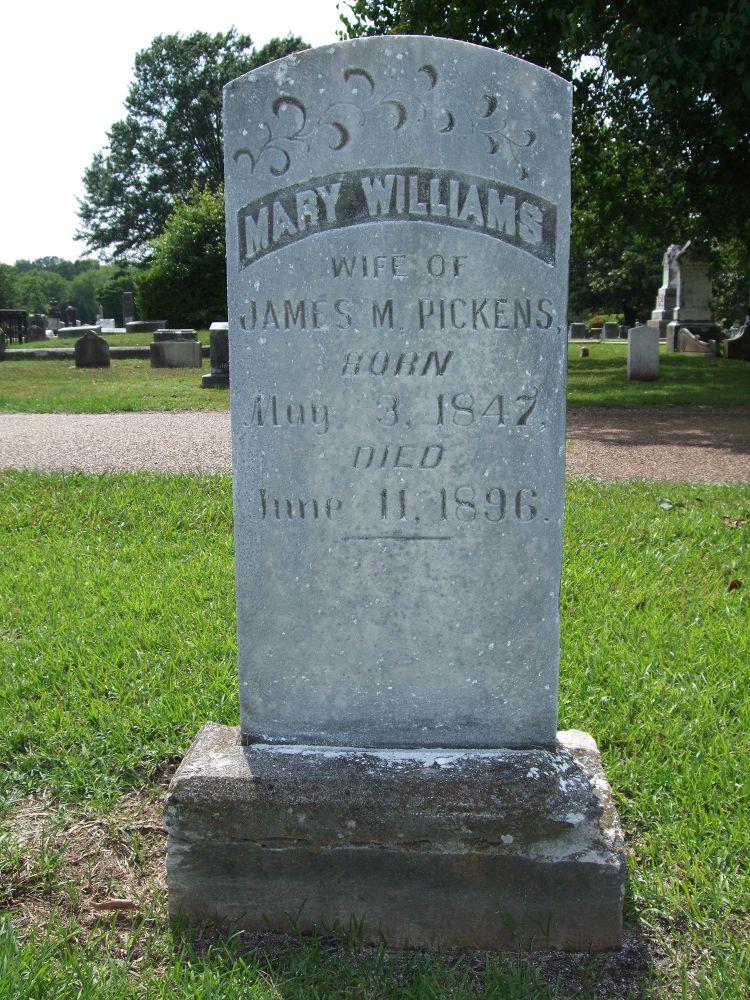
Mary Williams
wife of
James M. Pickens
BORN
May 3, 1847
DIED
June 11, 1896
![]()
